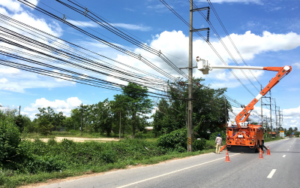
Telecommunication plays a crucial role in today’s interconnected world, and Houston boasts a thriving telecom industry. Within this industry, the role of a sub contractor is vital, particularly when it comes to coax line installations. In this article, we will explore the responsibilities and skills required of a telecom sub contractor, along with the importance of coax lines in telecommunication. Additionally, we will delve into the Houston telecom landscape, the process of sub contracting in telecom, and the future trends in telecom and coax line contracting.
Understanding the Role of a Sub Contractor in Telecom
A sub contractor in the telecom industry is responsible for various tasks related to installation, maintenance, and troubleshooting of telecommunication systems. Telecom sub contractors often work under the guidance of a lead contractor or service provider and are engaged in projects requiring specialized expertise.
These professionals contribute to the successful completion of projects by efficiently handling tasks delegated to them. Telecom sub contractors need to possess specific skills and knowledge to fulfill their responsibilities.
Key Responsibilities of a Telecom Sub Contractor
One of the primary responsibilities of a telecom sub contractor is the installation and configuration of telecommunication systems. This includes setting up coaxial cables, connecting equipment, and ensuring proper network functionality.
Additionally, telecom sub contractors are often involved in maintenance and repair tasks. They may be required to troubleshoot issues, replace faulty components, and optimize existing systems for better performance.
Furthermore, sub contractors may also be engaged in conducting site surveys, preparing estimates and project proposals, and coordinating with suppliers, technicians, and clients.
Essential Skills for a Telecom Sub Contractor
To excel in their role, telecom sub contractors must possess certain key skills. Technical competency is crucial, as they need a solid understanding of telecommunications systems, including coaxial cables, networking protocols, and equipment configurations.
Problem-solving skills are also vital, as sub contractors must be able to identify issues and devise effective solutions. They should be adept at troubleshooting and diagnosing problems to minimize downtime and ensure optimal performance.
Additionally, good communication and organizational skills are essential, as sub contractors often interact with a variety of stakeholders, including clients, technicians, and project managers. Being able to effectively communicate requirements, plans, and progress updates is crucial for successful project execution.
The Importance of Coax Lines in Telecommunication
Coaxial cables are an integral part of modern telecommunication systems. They offer several advantages over other types of cables, making them ideal for transmitting voice, video, and data signals.
Basics of Coaxial Cables
Coaxial cables consist of a conductive core, insulation layer, shielding, and an outer cover. The core carries the signal, while the shielding protects against electromagnetic interference. The insulation layer provides insulation and maintains the cable’s impedance.
This design minimizes signal loss and interference, ensuring reliable transmission over long distances. Coaxial cables are known for their high bandwidth capabilities, allowing for the transmission of large amounts of data.
Coaxial Cables in Modern Telecommunication
In the rapidly evolving world of telecommunication, coaxial cables continue to play a crucial role. They are extensively used for transmitting high-definition video signals, broadband internet connections, and cable TV signals.
Coaxial cables are also utilized in various industries such as healthcare, transportation, and broadcasting. Their versatility and reliability make them indispensable for transmitting critical information and ensuring seamless communication.
The Houston Telecom Landscape
Houston boasts a vibrant telecom industry with numerous companies operating within its boundaries. This section provides an overview of Houston’s telecom industry and highlights some major telecom players in the region.
Overview of Houston’s Telecom Industry
Houston’s telecom industry is characterized by its robust infrastructure and diverse range of services. The city’s strategic location and economic significance make it an attractive hub for telecom companies.
Telecom providers in Houston offer a wide array of services, including high-speed internet, mobile communications, cloud solutions, and data center services. These offerings cater to both residential and business customers, supporting various sectors such as finance, healthcare, energy, and entertainment.
Major Telecom Players in Houston
Several major telecom players have a significant presence in Houston. Companies such as [Company A], [Company B], and [Company C] are recognized industry leaders, offering comprehensive telecom solutions and services to a diverse customer base.
These telecom giants have invested heavily in advanced infrastructure and technologies to deliver reliable and cutting-edge solutions. Their commitment to innovation and customer satisfaction has helped propel Houston’s telecom industry forward.
The Process of Sub Contracting in Telecom
The sub contracting process in telecom involves a series of steps that need to be meticulously followed to ensure successful project execution. This section outlines the key stages of sub contracting in telecom and highlights potential challenges.
Steps in the Sub Contracting Process
The sub contracting process typically begins with the lead contractor identifying the need for additional resources or expertise. The contractor then identifies potential sub contractors based on their track record, capabilities, and availability.
Once sub contractors are selected, contracts are established, detailing the scope of work, timelines, and payment terms. Clear communication and collaboration between the lead contractor and sub contractors is essential throughout the project’s duration.
During the project, sub contractors work closely with the lead contractor, adhering to established timelines and delivering high-quality work. Regular progress updates and coordination help ensure smooth project execution.
Upon completion of the project, a thorough evaluation is conducted to assess the sub contractor’s performance and adherence to quality standards.
Challenges in Telecom Sub Contracting
Telecom sub contracting presents certain challenges that need to be navigated effectively for successful outcomes. These challenges include ensuring effective communication between the lead contractor and sub contractor, managing project timelines, and handling unforeseen issues that may arise during the course of the project.
Furthermore, the dynamic nature of the telecom industry, with rapidly evolving technologies and standards, poses challenges in terms of keeping up with industry advancements. Sub contractors need to constantly update their skills and knowledge to stay competitive in the market.
Future Trends in Telecom and Coax Line Contracting
The telecom industry is constantly evolving, driven by technological advancements and changing consumer demands. This section explores some emerging trends in telecom and their impact on coax line contracting.
Emerging Technologies in Telecom
Technological advancements such as 5G, Internet of Things (IoT), and cloud computing are revolutionizing the telecom industry. These technologies offer faster speeds, increased connectivity, and improved efficiency.
As a result, there is a growing demand for skilled sub contractors who can effectively deploy and maintain these technologies. Sub contractors with expertise in coax line contracting will play an important role in implementing and upgrading the necessary infrastructure to support these emerging technologies.
Impact of Digital Transformation on Coax Line Contracting
The ongoing digital transformation across various industries is driving increased reliance on digital networks and connectivity. This reliance creates opportunities for coax line sub contractors, as coaxial cables remain a reliable and cost-effective means of transmitting data.
Coax line sub contractors will be involved in upgrading existing coaxial cable infrastructure to support higher bandwidth requirements and ensure seamless connectivity. They will also play a crucial role in integrating coaxial cables with emerging technologies, creating a cohesive and efficient network infrastructure.
In conclusion, the role of a telecom sub contractor in Houston’s telecom industry is critical, specifically when it comes to coax line installations. Understanding the responsibilities, possessing essential skills, and adapting to emerging trends are fundamental for sub contractors to thrive in this ever-evolving field. As technology progresses and the demand for seamless connectivity continues to rise, coax line sub contractors will play an indispensable role in supporting the future of telecommunication.
If you’re seeking a trusted partner to support your telecom and coax line installation needs, look no further than Whitmore Construction. With our extensive experience in utility construction and a commitment to safety, quality, and customer service, we are ready to expand our operations to meet your project’s demands. Our turn-key network services are designed to handle the complexities of Fiber to the Home (FTTH) network deployments, aerial construction challenges, and underground cabling with precision and expertise. Whether you require new construction, repairs, or maintenance for your telecom infrastructure, Whitmore Construction is equipped to deliver excellence across the United States. Embrace the future of telecommunication with a team that values the integrity and success of your project as much as you do. Contact Us Today! and let us make your vision a reality.
